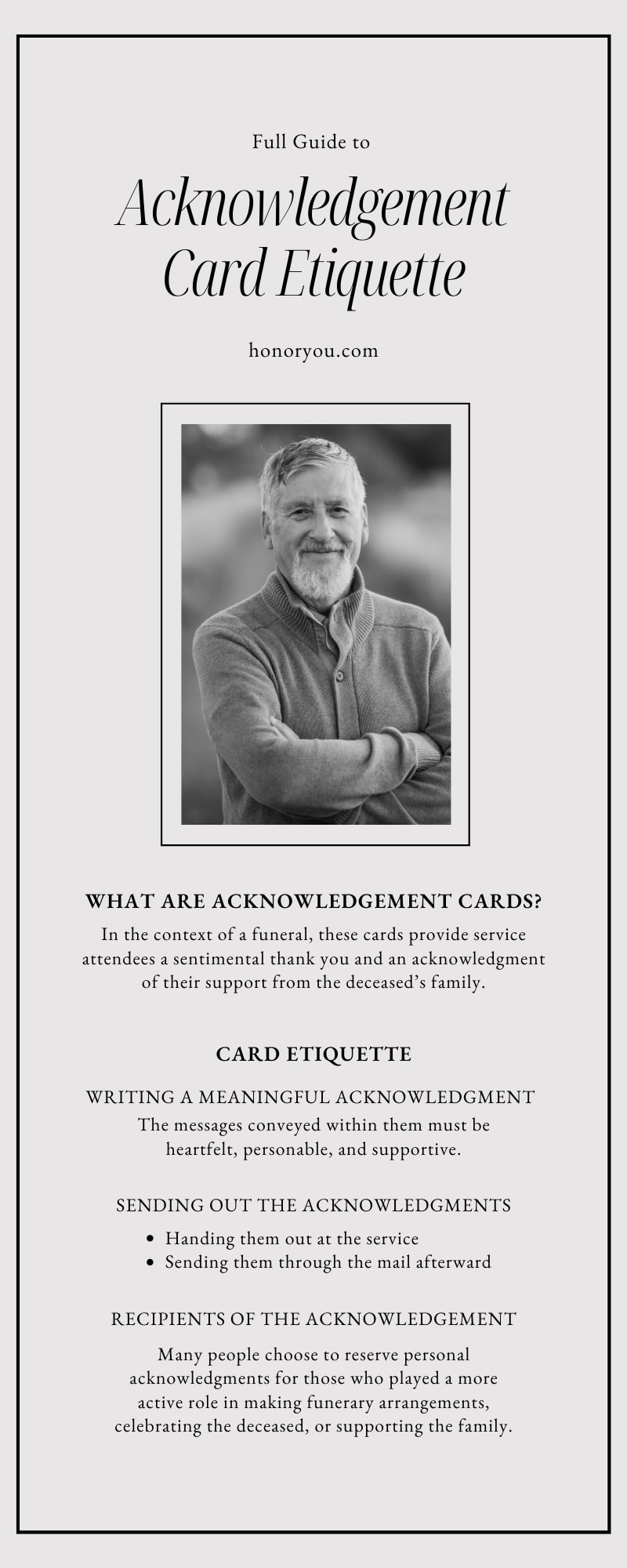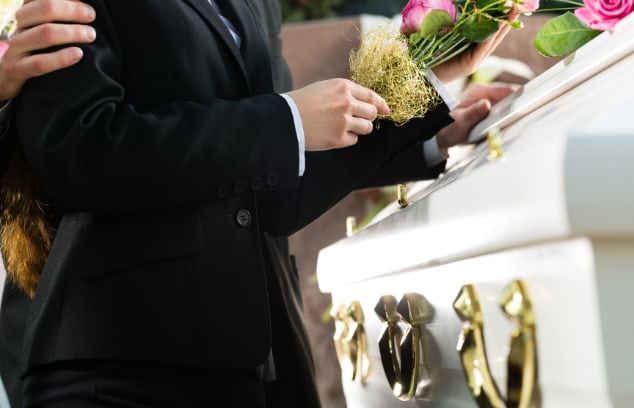Full Guide to Acknowledgement Card Etiquette
Losing a loved one is an indescribably difficult experience. But during it, your family, friends, and community members will reach out to show you how much they care. Moreover, they will let you know how everyone who knew your loved one deeply feels the loss.
When they do, it’s crucial to let them know that you appreciate their support fully. And that’s where funerary customs like acknowledgment cards can help. Read on to learn more about the importance of acknowledgment cards and the proper etiquette for sending them out.
What Are Acknowledgement Cards?
Before we delve into the proper etiquette for acknowledgment cards, we should review what they are. In the context of a funeral, these cards provide service attendees a sentimental thank you and an acknowledgment of their support from the deceased’s family.
Send these cards as a gesture of kindness to anyone who attends the service. Although, sometimes, the dearly departed’s family will choose to only send them out to a small group of individuals more intimately involved with the funeral arrangements. But we’ll discuss that in more depth later.
Why Are They Important?
Now that we understand what they are, we can discuss why acknowledgment cards are an essential aspect of funerary tradition. As previously mentioned, these cards are a gesture from the deceased’s family to funeral attendees. Moreover, they express a mutual understanding and support among those mourning the dearly departed.
Most importantly, they do this in a way that doesn’t require family members to address each guest individually. This is especially beneficial when considering how emotionally taxing it can be for family and close friends to shake hands with and personally thank every person for their support. For this reason, acknowledgment cards are a significant part of funerary customs.
Card Etiquette
Like any other funerary custom, acknowledgment cards come with a particular set of rules and proper etiquette when sending them out. For instance, the sender chooses the cards’ content very thoughtfully.
Knowing how and when to send them out is also a part of proper acknowledgment card etiquette. Of course, these are fundamental explanations for what constitutes this type of funerary etiquette. To have a clear and more nuanced understanding of these things, we must explore these elements in more depth.
Writing a Meaningful Acknowledgment
Let’s begin with discussing how to write a meaningful acknowledgment card. You will send these cards to your family, friends, and community members. For this reason, the messages conveyed within them must be heartfelt, personable, and supportive. You may choose to write individual notes for each of your recipients.
You can mention your favorite memories of them and your lost loved one. On the other hand, it may feel too overwhelming a task to address everyone with a personalized message. Rest assured, you always have the option of choosing one message and card layout that works for everyone on your recipient list.
Then, instead of using individual stories or anecdotes about your guests and the deceased, you can add a special gift, like memorial bookmarks, to your cards. Doing so allows you to gift your recipients a meaningful keepsake while recognizing their own loss and grief during such a difficult time. In any case, ensuring that the content of your cards is heartfelt and meaningful is of the utmost importance.
Sending Out the Acknowledgments
Of course, there is also a certain etiquette surrounding how you send your acknowledgment cards out to everyone on your list. Fortunately, you have two primary options:
- Handing them out at the service
- Sending them through the mail afterward
The method you choose will depend on personal preference. Suppose you feel it would be simpler and more appropriate to hand the cards out as people walk into the service. If so, you could pair them with your funeral pamphlets and give one to each guest as they arrive.
Just be mindful that your cards will be less personalized with this method. On the other hand, you may wait until after the funeral to send your acknowledgment cards through the mail. This allows you more time to plan what you want to say on each card. Plus, it enables you to write personal messages for each one.
Sending personalized cards will take a bit longer to complete, and the process is more detailed. However you choose to do it, the most important thing is to do what’s most comfortable for you during this difficult time.
Recipients of the Acknowledgement
Once you sort out the content of your cards and how you will send them out, it’s time to determine who will receive them. We’ve touched on the possibility that you might hand one out to everyone that attends your service. Of course, if you deem this the most appropriate method, it’s an excellent option.
However, it is not necessary to send acknowledgment cards to everyone who attends the funeral. Many people choose to reserve personal acknowledgments for those who played a more active role in making funerary arrangements, celebrating the deceased, or supporting the family, such as:
- People who have sent or bought flowers for the family
- Those who have donated to a charity or organization in honor of your loved one
- Those who sent personal letters or condolence cards
- People who helped arrange the mass or any other special service
- People who provided tangible support like meals, babysitting, cleaning, or running errands
- Musicians or people who did a reading at the service
These are just a few examples of people you might reserve an acknowledgment card for. Of course, who you send them out to is a matter of personal comfort and preference.
Final Thoughts
In short, acknowledgment cards are an essential funerary custom. Moreover, they’re a gesture of kindness between you and those who support you in your time of need. With that said, there is proper etiquette to follow with these cards to ensure they send the best possible message to each person who receives one.
Hopefully, we were able to provide some valuable information on this etiquette so that you know how to approach your acknowledgment cards when the time comes.





